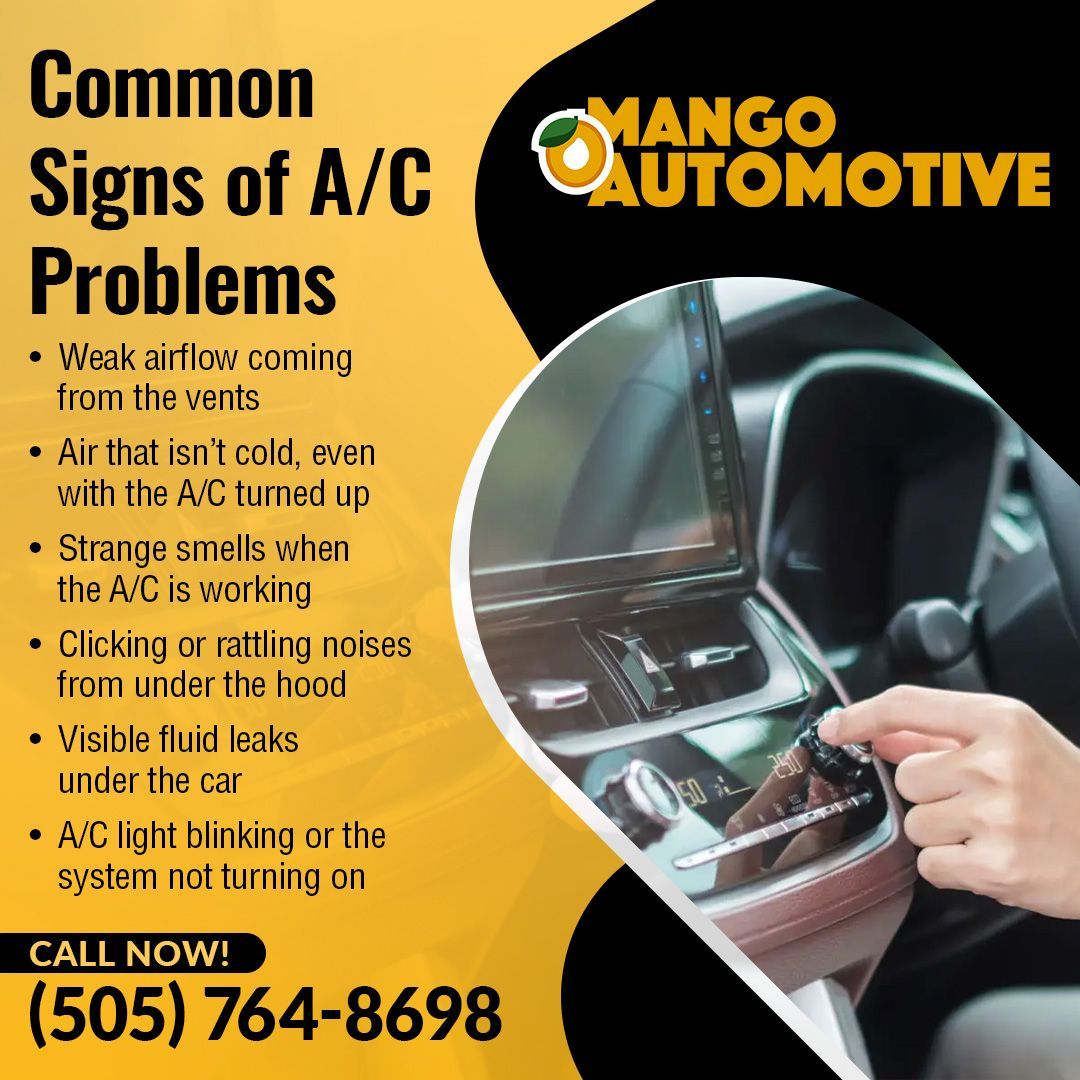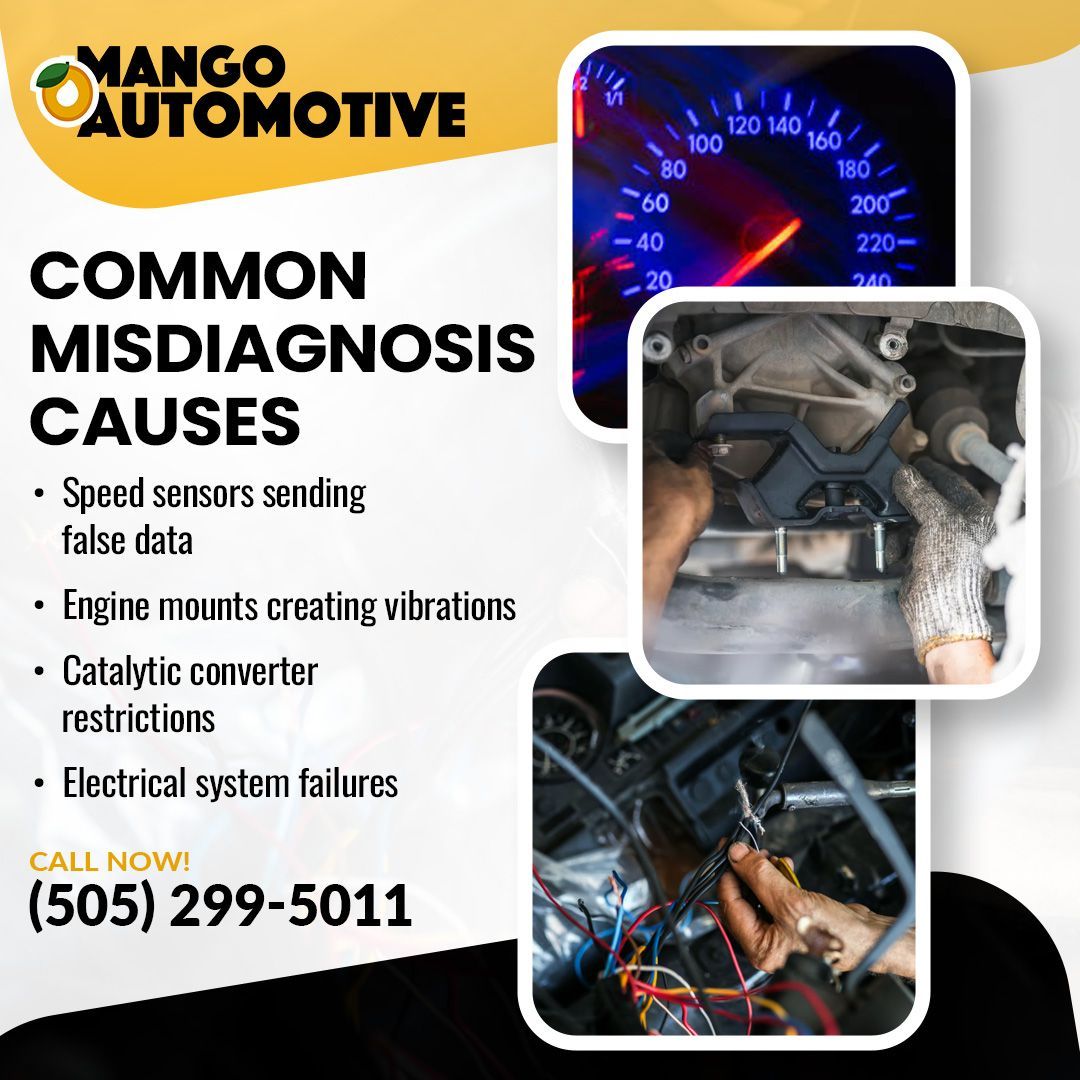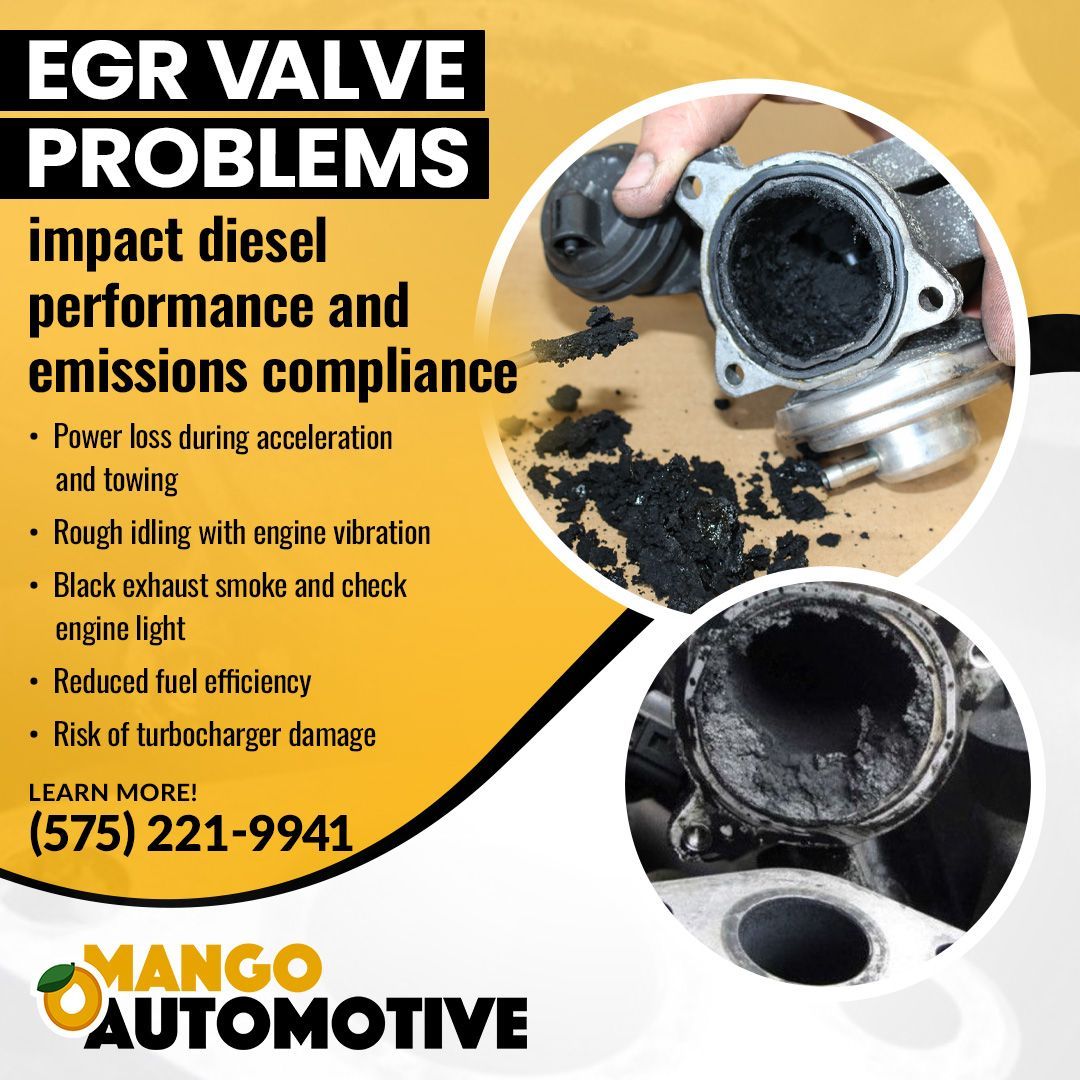Repair or Replace Auto A/C Components? Trusted Advice from Mango Automotive
At
Mango Automotive, drivers around Albuquerque often ask us whether it’s better to repair a faulty A/C part or replace it entirely. The short answer is that it depends on the part, the severity of the issue, and the long-term cost. In some cases, like small leaks or electrical faults, a repair is all that’s needed. However, with larger problems, such as a worn-out compressor or a failing condenser, replacement may be the more reliable and cost-effective choice. In this blog, we’ll break down how our
mechanics in Downtown Albuquerque approach A/C diagnostics, when we recommend repairs, and when a full part replacement is the better option.

Overview of Automotive A/C Systems
The A/C system cools and dehumidifies the air inside your vehicle. It uses a refrigerant to move heat from the cabin to the outside air. This process involves compression, condensation, expansion, and evaporation in a closed loop.
All parts must work together for consistent cooling. A failure in any one component can affect the entire system. At Mango Automotive, we troubleshoot each part to confirm where the problem starts before making any recommendations.
What the A/C System Does
Your car’s A/C system removes heat and moisture from the air before it enters the cabin. It doesn't just blow cold air. The system changes the refrigerant from gas to liquid and back to gas to transfer heat out of the vehicle. If you notice weak airflow, warm air, or loud noises when the A/C is on, one or more components could be affected.
Core Components of the System
Each part of the A/C system plays a specific role. Here’s how we check and evaluate them at our Albuquerque locations.
Compressor
The compressor is the part that pressurizes the refrigerant and moves it through the A/C system. It acts as the system’s pump. Without it, nothing flows, and no cooling occurs. If the compressor seizes, leaks, or makes loud clicking or grinding noises, a replacement may be necessary.
Some compressors fail due to a lack of lubrication or old refrigerant. In minor cases, leaks can be repaired. At Mango Automotive, we always check for debris or damage inside the system before replacing this part.
Condenser
The condenser cools the hot refrigerant gas by releasing heat to the outside air. It’s usually located near the front of the vehicle, close to the radiator. If it's clogged with dirt or damaged, airflow is restricted, and cooling becomes weak.
When a condenser leaks or its fins are crushed, we suggest replacement. Partial blockage from corrosion is another common issue in Albuquerque’s climate.
Evaporator
The evaporator absorbs heat from the air inside the cabin and lowers humidity. This part is often hidden behind the dashboard. If it leaks, moldy smells may come from the vents. A clogged evaporator may also reduce airflow, even if the blower motor works fine.
Because of its location, repairs can be labor-intensive. At Mango Automotive, we only recommend removing and replacing the evaporator when testing confirms it’s the source of the problem.
Expansion Valve or Orifice Tube
This component controls how much refrigerant enters the evaporator. It changes the high-pressure liquid refrigerant into a low-pressure mist so it can absorb heat efficiently. A stuck valve can cause frost on lines or erratic cooling. If the expansion valve or orifice tube clogs or fails, we usually replace it. It’s a small part, but it affects the entire pressure balance in the system.
Refrigerant
The refrigerant carries heat through the system and changes state as it moves from part to part. If the refrigerant level is low, the system won’t cool properly. Leaks are the most common issue, and we check for them using dye or electronic detectors. Simply refilling the refrigerant without fixing leaks only gives short-term relief. Our auto mechanics in Albuquerque always check for underlying causes before adding refrigerant.
Common Signs of A/C System Problems
A/C issues often start with weak airflow, warm air, or strange noises. These symptoms usually point to worn parts, leaks, or system blockages. If you notice any of the signs discussed below, it’s time to have your system inspected by a qualified mechanic in Albuquerque.
Weak Airflow
Poor airflow can mean a clogged cabin filter, a failing blower motor, or a blocked evaporator. If the fan seems to work but little air comes through, we check for a buildup in the evaporator core. We also test blower speeds and air duct pressure to rule out electrical issues. This problem is often seen in older vehicles or after long periods without use.
Warm Air From Vents
If the A/C blows warm air, the system may be low on refrigerant, or the compressor may not be working. This is one of the most common A/C repairs for which customers visit our shop. Sometimes, it’s a simple leak. A compressor clutch that won’t engage or a pressure switch failure can also cause warm air from the vents. At Mango Automotive, we inspect the full loop, from refrigerant level to fan operation, before suggesting repairs.
Leaking Fluid
Fluid around the A/C lines or near the front of the vehicle can mean a refrigerant or oil leak. A/C oil has a light texture and may leave stains near the compressor or condenser. Ignored leaks can cause compressor failure. Our mechanics in Albuquerque use the latest methods to detect leaks. Repairs are easier and less expensive when leaks are found quickly.
Strange Noises
Clicking, squealing, or grinding sounds may come from the compressor, fan, or A/C clutch. Unusual noises while the A/C is operating are a sign that something is wearing down. If the noise gets louder or changes with engine speed, the compressor bearing may be failing. Our mechanics in Downtown Albuquerque check belt tension, pulley alignment, and clutch operation to find out what’s making the sound.
Inconsistent Cooling
If the A/C cools sometimes but not always, the issue may be with the sensors, electrical controls, or pressure balance. Inconsistent cooling can also point to a sticky expansion valve or an overcharged system. These conditions affect performance but don’t always trigger warning lights. We log temperature readings and refrigerant pressure at multiple points to track where cooling is lost.
Repair: When a Fix Is All You Need
Low Refrigerant or Minor Leaks
Recharging the system and sealing a small leak can restore proper cooling. Low refrigerant usually points to a leak. If the leak is small, often found at O-rings, service ports, or hose connections, it can be sealed, and the refrigerant can be refilled.
Clogged Cabin Air Filter
A dirty air filter can reduce airflow, but doesn’t require major repair. If your vents are blowing weakly but still cold, the cabin air filter may be blocked. Replacing it is quick and inexpensive. It’s a common fix that many drivers overlook.
Electrical Faults (Switches, Relays, Fuses)
If the system doesn’t turn on, the issue could be a failed switch or fuse. These parts control power to the A/C system. If they stop working, the compressor won’t engage—even if other components are fine. At Mango Automotive, we test circuits and components to isolate the faults and repair them.
Sensor or Control Module Malfunctions
A faulty sensor can stop the system from running even if nothing is broken. The A/C system relies on inputs from pressure sensors, temperature sensors, and control modules. If any of these sensors send incorrect signals, the cooling performance drops. Rather than replace the whole system, our auto mechanics in Albuquerque use diagnostics to find the specific part that needs repair.
Replacement: When Components Can’t Be Saved
Some A/C problems go beyond simple fixes and require part replacement. When a part breaks or causes wider damage to your system, replacement becomes the only reliable option. At Mango Automotive, we handle these issues with careful inspection and quality parts, helping customers throughout Albuquerque keep their cars in good condition.
Compressor Failure
If your compressor fails, it can affect the entire air conditioning system. When it breaks, the A/C can stop working entirely. Loud noises, weak airflow, or a seized clutch are typical signs of compressor failure.
Once a compressor fails, it can release metal shavings into the system. These particles spread through the condenser, expansion valve, and even the evaporator. The compressor must be replaced to avoid further damage, and the system must be cleaned.
Condenser Damage
Debris, corrosion, or front-end damage can ruin your condenser. The condenser sits near the front of the car, where it’s vulnerable to road debris. Rocks or bugs can bend the fins or puncture the tubing. Corrosion can also weaken the metal in the long run.
When the condenser becomes blocked or leaks, cooling suffers. Restricted airflow can increase system pressure and shorten the lifespan of other parts. In most cases, replacement is more reliable than trying to patch the damage.
Evaporator Issues
Evaporator coils can leak or become blocked, making replacement the better option. The evaporator is located behind the dashboard, and it absorbs heat from inside the cabin. Leaks can be hard to detect until cooling fades. You might also notice a musty smell or moisture in the cabin. Because of its location, repairing the evaporator requires a lot of labor. If the coil is leaking or clogged, it’s usually more cost-effective to replace it rather than attempt a repair.
Worn Expansion Valves or Orifice Tubes
If the refrigerant isn’t flowing properly, the expansion valve or orifice tube could be the issue. These parts control how much refrigerant enters the evaporator. If the valve gets stuck open or closed, cooling may be inconsistent or stop altogether. Pressure readings that fall outside the normal range often point to this problem. At Mango Automotive, we replace the valve or tube to restore balance and prevent long-term system wear.
Interconnected Problems: How One Failure Can Cause Others
One failing A/C part can damage others if not handled early. The A/C system depends on several parts working together. If one fails, it often puts extra stress on the rest. In many cases, this leads to more expensive repairs down the line.
Compressor Failure Leading to System Contamination
When a compressor breaks, it can release metal particles that clog the system. Inside the compressor are tightly fitted parts that manage refrigerant flow. If it fails internally, metal debris can spread through the lines, condenser, expansion valve, and evaporator.
These particles can block refrigerant flow or damage other components. Even after the compressor has been replaced, the system has to be flushed out, and every major part must be inspected. In some cases, a contaminated system will need multiple components replaced to restore proper cooling.
Prolonged Refrigerant Leak Damaging the Compressor
Running your A/C with low refrigerant can overheat and wear out the compressor. Refrigerant helps carry oil that keeps the compressor lubricated. If there’s a slow leak and the system runs too long without enough refrigerant, the compressor can overheat or seize up.
This damage isn’t always immediate. Customers may notice weak cooling or noise from the engine area before the compressor fails. Repairing the leak early on avoids a much more costly replacement.
Preventive Care to Extend the Life of the A/C System
Basic maintenance keeps your A/C working longer and avoids costly repairs. Many common A/C problems can be avoided with regular care. At Mango Automotive, we help drivers in Albuquerque stay ahead of issues through simple but effective maintenance practices.
Routine Inspections
A trained mechanic can spot early signs of wear before they become larger problems. Our mechanics in Downtown Albuquerque check for refrigerant leaks, listen for compressor noise, and make sure the airflow is consistent during routine inspections. These inspections are especially useful before summer or long trips.
Even small issues, like a loose belt or low refrigerant level, can put strain on the system. Our
mechanics in Albuquerque often find and correct these during scheduled service visits.
Recharging Refrigerant When Needed
Refrigerant naturally leaks in small amounts each year. If your A/C isn't cooling well, a recharge might be needed. At Mango Automotive, we check pressures to see if a recharge is safe or if there's an underlying leak. Our team uses certified equipment to recharge the system correctly and confirm that everything is sealed and operating within normal pressure limits.
Running the A/C Year-Round
Using the A/C in winter helps keep the system parts moving and prevents seals from drying out.
Turning on the A/C now and then in the cooler months keeps the system in good shape. It also clears moisture from the windshield by pulling humidity out of the cabin. We recommend using your car’s defrost mode occasionally since it engages the A/C compressor even when it’s cold outside.
Cabin Air Filter Replacement
Filters collect dust, pollen, and debris. This can reduce airflow from the vents and affect cooling performance. A dirty filter also puts added strain on the blower motor. Most vehicles need the filter changed every 15,000 to 20,000 miles, though dusty environments like Albuquerque may require more frequent changes. During routine service, our mechanics in Albuquerque check your filter and let you know if it needs replacement.
Mango Automotive: A/C Expertise in Downtown Albuquerque
Our experienced auto mechanics in Albuquerque provide clear answers, fast service, and trusted A/C repair. At Mango Automotive, we focus on providing customers with straightforward service backed by skill and experience. When your A/C isn’t working right, our team diagnoses the issue, explains your options, and provides repairs that last.
Transparent Recommendations
We explain what’s wrong, what it takes to fix it, and whether repair or replacement makes more sense. We don’t push unnecessary work. If a recharge or fuse replacement solves the problem, that’s what we’ll do. If a major part has failed, we’ll show you the evidence and walk you through the next steps. Our mechanics in Downtown Albuquerque provide honest service. We take the time to answer your questions and help you make decisions that fit your car and your budget.
Full System Diagnostics
We test every part of your A/C system to find the exact cause of the problem. From checking refrigerant pressure to inspecting electrical components, our mechanics in Albuquerque use detailed testing to understand what’s wrong. We also check for related wear that might lead to more issues if left alone. This approach avoids guesswork and prevents repeat visits. We don’t replace parts unless we’re confident it’s the right fix.
Fast Turnaround and Fair Pricing
At Mango Automotive, we provide faster turnarounds, upfront estimates, and no surprise fees. We keep common parts in stock and prioritize same-day repairs whenever possible. If a part needs to be ordered, we’ll let you know right away and keep you updated on the timing. Pricing is always quoted before we start work. We aim to give Albuquerque drivers real value—not just in cost but in the time and frustration saved by getting it done right the first time.

Know When to Repair or Replace—And Who to Trust With the Work
A working A/C system depends on preventive maintenance, early detection of repairs, the right diagnosis, and repairs done with care. Small issues like low refrigerant or electrical faults are often repairable. Larger problems, such as a compressor or evaporator failure, may call for part replacement to restore full function. Acting early on can keep costs down and protect the rest of the system from damage.
At Mango Automotive, we offer accurate diagnostics, honest advice, and A/C repair from experienced auto mechanics in Albuquerque you can rely on. Whether your vents are blowing warm air or your system won’t turn on, we’re here to help get your car back to comfort—quickly and affordably.
Don’t wait for small A/C issues to become bigger problems. Call Mango Automotive at
(505) 764-8698 or visit our Downtown Albuquerque location to schedule your A/C inspection or repair. Our certified auto mechanics are ready to help.













